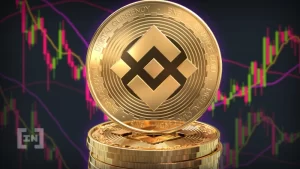Cryptocurrency has gained prominence in financial markets, attracting investors. Our blog highlights select assets for market insights, not investment advice. Research before investing.
Crypto tokens are essentially digital assets with a cryptographic foundation. The distinct use cases that every coin or project aims to address provide them with value. These tokens operate inside a blockchain, which is an open, transparent, decentralized record of transactions that is available to anybody. Notably, all information and transactions stored on a blockchain are irreversible and unchangeable.
As things are right now, there are a ton of opportunities in the cryptocurrency space. You can explore a wide range of platforms and experiences, from simple transactions to interacting with NFTs, sports platforms, and even gaming applications.
2024’s Top 5 Cryptocurrencies
The Bitcoin (BTC)
Bitcoin, the pioneering and widely embraced cryptocurrency, has catalyzed the entire industry since its inception in 2009, garnering immense attention.
The Proof of Work consensus secures the network, serving as an alternative to cash payments. Miners record all transactions on a blockchain and receive payment for validating each block.
Pros of Bitcoin: The most popular token, which attracts significant investment in the project, Relatively stable in comparison to certain more recent cryptocurrency tokens.
Bitcoin Cons: It closely tracks the overall cryptocurrency market, limiting independent movement.
Its proof-of-work mechanism consumes significant electricity and delays transaction confirmations.
Ethereum (ETH)
Ethereum, second to Bitcoin, pioneered smart contracts, automating vital functions and solidifying its impact. Ethereum tops the blockchain list to fulfill this need since its design aimed to provide a platform for decentralized finance and apps.
Advantages of Ethereum: The biggest participant in the DeFi and dApp markets. Because of its market dominance and requirement that rivals provide considerably stronger incentives to switch, Ethereum’s Proof of Stake consensus mechanism has greatly improved the efficiency of the blockchain. Future developments will mostly concentrate on boosting TPS and strengthening the current strong security procedures.
Cons of Ethereum: Transactions on Ethereum may occasionally bog down due to excessive network traffic. Ethereum’s transaction fees have the potential to soar, and it needs to rely on scaling solutions to handle the volume of traffic on its network. The fees may exceed the transaction value in certain circumstances.
The Binance Coin (BNB)

Since 2017, BNB has evolved from a basic token to the ecosystem’s powerhouse. At first, Binance Coin utilized BNB to grant cryptocurrency exchange users unique access to initial coin offerings, reduced fees, and rebates.
It currently serves as the foundation of the BNB Chain ecosystem, which competes with Ethereum’s hegemony thanks to its high speed and cheap cost. It has made a name for itself in the market as a reliable choice.
Benefits of BNB: It can meet far higher demand than many competitors due to its low prices and fast throughput. There are advantages to owning BNB on the Binance exchange platform.
BNB’s cons include its high centralization under Binance’s control, impacting its success. Regulatory scrutiny from various nations, like the UK, Japan, and Germany, further restricts community freedom.
Solana (SOL)
Solana is a decentralized blockchain network primarily designed for scalability. With a transaction pace of about 65,000 per second, it is among the quickest blockchains available. It does this by utilizing the distinct Proof of History consensus process, which enables network nodes to synchronize time.
One of the DeFi space’s fastest-growing initiatives, Solana is sometimes referred to as an “Ethereum-killer.”
Pros of Solana: The platform boasts extremely cheap transaction fees, with an average of $0.00025; • Solana is one of the fastest blockchains available, which makes it quite popular among investors.
Cons of Solana: Only smart contracts designed for the network can be used with Solana because it is difficult to interface with Ethereum. Due to multiple network disruptions, users have found Solana to be unreliable.
Ripple (XRP)
XRP is concentrated on developing payment solutions for banks and financial institutions, in contrast to other general-purpose coins. It addresses a number of issues with other systems, such as SWIFT, for cross-border payments. With XRP, payments of this kind can be finished in a matter of seconds, as opposed to taking several hours or days.
Continue reading: Describe Ripple (XRP).
Thanks to its effective use of blockchain technology, Ripple has significantly increased user accessibility to traditional finance.
Advantages of Ripple: Lowers obstacles to usage, enabling wider access to banking and international settlement; • Much faster than rivals like SWIFT.
Ripple Labs faces cons: The US Securities and Exchange Commission is suing the company, and a federated group of financial institutions verifies every transaction, rendering the network highly centralized.